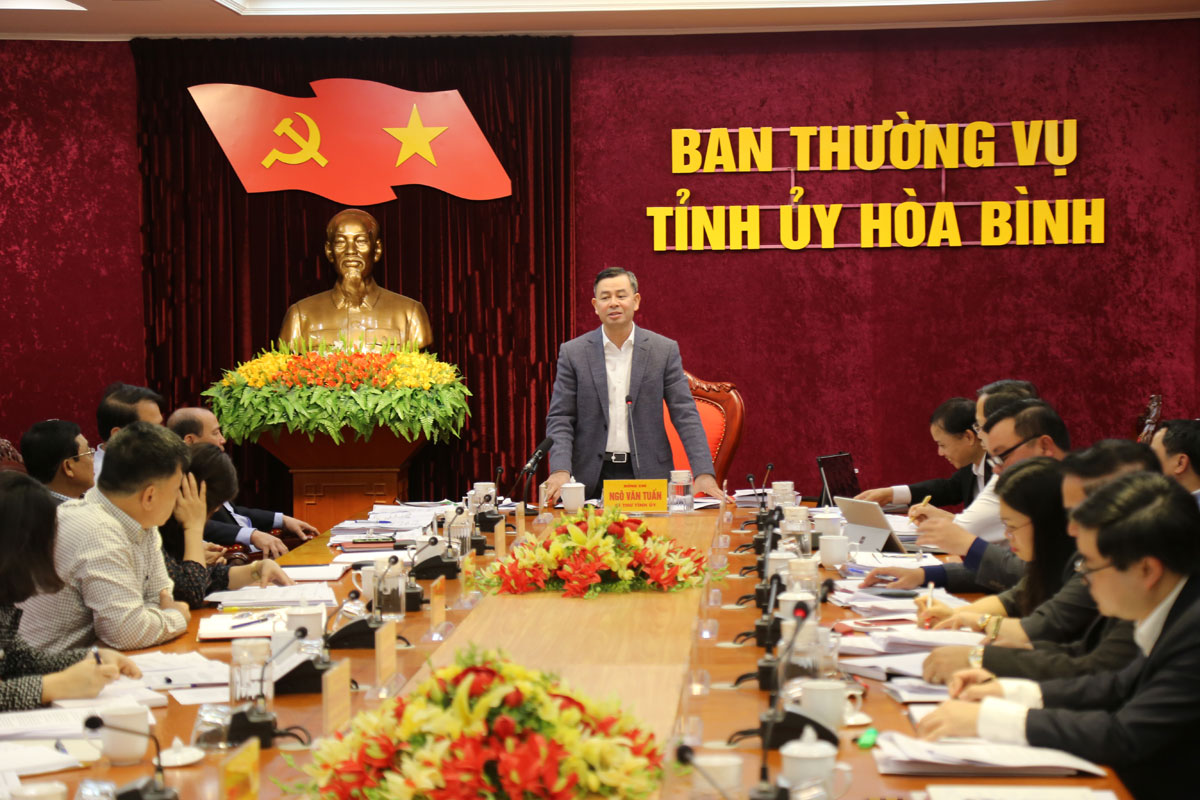
(HBO) – Secretary of the Hoa Binh provincial Party Committee Ngo Van Tuan chaired a conference of the committee’s standing board on December 29 to review the implementation of the Party Committee’s resolutions on tourism, industrial, craft, and trade development, and some important socio-economic development issues.
 Secretary of the provincial Party
Committee Ngo Van Tuan addresses the conference.
Secretary of the provincial Party
Committee Ngo Van Tuan addresses the conference.
The event discussed reports by
the Party unit of the provincial People’s Committee about the implementation of
the provincial Party Committee’s resolutions on tourism, industrial, craft, and
trade development, along with development orientations for the years to come.
Secretary of the provincial
Party Committee Ngo Van Tuan emphasised that tourism, industry, craft, and
trade are important pillars of the local development.
He said draft resolutions and
conclusions should assess achievements as well as weaknesses and shortcomings,
point out lessons, and forecast development trends for different areas so as to
devise detailed solutions, assign concrete tasks to each cadre, and adhere to
the 17th provincial Party Congress’s resolution to perform duties.
The resolution on tourism
development has to focus on planning; developing infrastructure, especially
transport facilities; and associating tourism development with cultural
preservation, environmental protection, and security and order ensuring. It
should also put stress on the development of cultural and ecological tourism
along with specialty agricultural products, and on the enhancement of tourism
promotion and investment attraction to the sector, he said.
The resolutions on industrial
and craft development need to pay special attention to planning, site
clearance, infrastructure investment, and attraction of investment to projects
with high added value, and environmental sustainability.
Meanwhile, the one of trade
development need to clarify development trends while paying heed to e-commerce,
high-quality products with reasonable prices, technological application, and
promotion of the products Hoa Binh has strength in, Tuan added./.
The Standing Board of the Hoa Binh provincial Party Committee has agreed in principle on a proposal by the Standing Board of the Party Committee of Hoa Binh city to gather feedback on the city’s 1:2000 zoning plan, which forms part of its broader urban development strategy.
Hoa Binh province has made notable progress in public administration reform and digital government development, with the satisfaction index among citizens and businesses reaching over 84%, according to recent government evaluations.
Thanks to great efforts by local authorities in recent times, the governance and public administration performance of Mai Chau district has been significantly improved.
In the afternoon of June 6, the Party Committee, the People's Council, the People's Committee and the Fatherland Front of Lac Son district solemnly held a meeting to celebrate the 139th anniversary of the district's founding (1886–2025) and the 79th anniversary of the establishment of the district's Party Committee (1946–2025). There was the attendance of Mr. Bui Van Thang, the Vice Chairman of the Provincial People's Council; Mr. Quach Tat Liem, the Vice Chairman of the Provincial People's Committee; Ms. Dang Bich Ngoc, the Deputy Head of the National Assembly Delegation of the province; as well as the former leaders of the province and district through various periods, who are the natives of the district.
Implementing the Politburo’s Resolution No. 57-NQ/TW on breakthroughs in science – technology, innovation, and digital transformation is a golden opportunity for the northern mountainous province of Hoa Binh to renew growth model, improve competitive edge and shorten digital gap.
Resolution 57-NQ/TW, issued by the Politburo on December 22, 2024, identifies sci-tech, innovation, and digital transformation as strategic breakthroughs to build a developed and prosperous nation. In Hoa Binh province, this spirit is not just a slogan, it’s being put into action through concrete initiatives that form a "new development triangle”: digital citizenship, digital economy, and digital administration.



 Secretary of the provincial Party
Committee Ngo Van Tuan addresses the conference.
Secretary of the provincial Party
Committee Ngo Van Tuan addresses the conference.